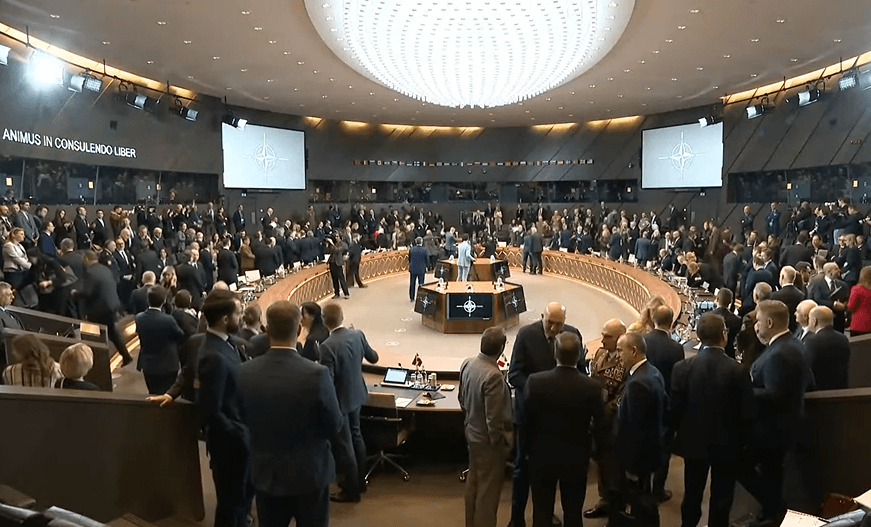Europe must be prepared to take the initiative in the aftermath of a ceasefire or peace agreement in Ukraine, addressing issues related to security guarantees and reconstruction.
Germany and Munich are currently in the spotlight for a variety of compelling reasons. The city’s prominent annual security conference, set to commence on Friday, will open with surprise following Donald Trump’s declaration on Wednesday advocating for immediate negotiations regarding Ukraine.
The defense minister stated during a meeting in Brussels that Ukrainian NATO membership is not an option, that Ukraine must relinquish certain territories, that the United States will not offer any defense guarantees, and that American troops will not oversee a potential ceasefire.
The second reason is that Germany is approaching new elections, and all indications suggest a shift in the government in Berlin. According to the latest opinion polls, it appears that the CDU/CSU is poised to establish a new government, with Friedrich Merz likely stepping into the role of Chancellor. Regardless of the composition of the coalition, it signifies a positive shift.
Moreover, Munich experienced a significant disturbance due to an assault on a trade union demonstration march on Thursday.
Numerous criticisms surround Donald Trump’s approach, particularly his treatment of the harsh Russian president, whom he engages with as if he were just another global leader, even extending an invitation for a visit to Washington. However, it is essential for the conflict to transition into a new phase and for discussions to commence. Zelensky has made this appeal, and European capitals have been discreetly aligning their actions for some time now.
It is widely acknowledged that a military resolution to the conflict is unattainable. The situation in Ukraine is such that reclaiming lost territory seems unattainable, while Russia’s grip on the entirety of Ukraine remains elusive. Exploring new avenues is essential.
Trump has sidestepped any efforts to align his strategies with European counterparts. He evidently holds little regard for Europe and its leaders, opting instead to focus directly on the key figures: Vladimir Putin and Volodymyr Zelensky.
While he raises valid concerns regarding the lack of robust action from Europe, his methodology remains highly contentious. Ukraine is located in Europe. The trajectory of Ukraine holds significant implications for the entire continent of Europe.
Undoubtedly, the involvement of European leaders is essential in these discussions. Considering the prevailing sentiment among Americans, there appears to be a strong belief that it is the responsibility of European forces and financial resources to guarantee the successful implementation of any future peace agreement. That’s quite a statement.
The advance establishment of specific frameworks for negotiations by the Trump administration raises significant concerns. Defense Secretary Pete Hegseth’s assertion that Ukrainian NATO membership is unrealistic and that Ukraine is unlikely to reclaim its pre-2014 territory effectively signals a concession to Russia.
It appears that Ukraine may need to make certain concessions during the negotiations for a ceasefire and a potential peace treaty, similar to the requirements that will be placed on Russia. Zelensky has recently suggested the potential for “swapping territory” with Russia, specifically mentioning Ukraine’s control over the Russian Kursk region.
Ultimately, the shape of any potential concessions rests solely in the hands of the Ukrainians.
Nonetheless, Europe still has the opportunity to engage in the negotiations. This weekend’s security conference presents a prime opportunity for our leaders to engage with Pete Hegseth, Vice President JD Vance, and Trump’s Ukraine envoy Keith Kellogg, emphasizing the significant benefits the United States stands to gain from strengthened transatlantic cooperation.
It is crucial to convey the message that the opposition in this conflict extends beyond Russia, encompassing North Korea, and indirectly involving China and Iran – representing the full spectrum of the axis of evil. The West must present a united front against them.
Europe must prepare to take the initiative in the aftermath of a ceasefire or peace agreement in Ukraine, addressing both security guarantees and reconstruction efforts. On one side, it is entirely justifiable, considering the geographical context.
It is crucial for us to halt Russia’s ongoing illegal annexation efforts to the west. On one side, this may be the sole approach to engage the United States in the region, to provide assistance. Conversely, this serves as a powerful demonstration to Donald Trump and the global community that Europe cannot be easily dominated or disregarded. Europe holds significant relevance.
The journey toward that objective requires enhanced economic and military capabilities within Europe. The European NATO nations need to expedite their military preparations and deploy ground forces to Ukraine to oversee a potential ceasefire.
It is hoped that a shift in leadership in Berlin will facilitate a unified European approach to its future and encourage a sense of accountability for its own path.
The author Frida Wallnor is a renowned Swedish journalist.










+ There are no comments
Add yours